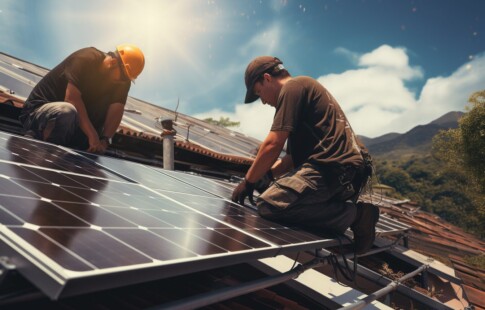
How Renewables Can Prevail Despite Trump’s Renewable Energy Policy
We are reader-supported. When you buy through links on our site, we may earn affiliate commission.
America’s Trump-Republican government has rendered its judgment on climate change with vast silence and outlined its renewable energy policy by doubling-down on coal. We thought Trump’s renewable energy policy would reach “peak contrarian” when we pulled out of the Paris Climate Accord. But the truth is, we’ll scarcely have a single environmental regulation on the books by the time this administration is shown the door.
The good news is, there’s lots of good news. We don’t have to get partisan about the damage done when the wrong people get elected. Let’s focus instead on the undeniable momentum behind the pivot to renewable energy, despite Trump’s renewable energy policy.
Understanding that the U.S. is just one piece of the global puzzle, and that what’s happening here is raising consciousness elsewhere in the world, might help our current political situation feel slightly less sad and regressive. So let’s jump into the good news about why renewables are set to prevail no matter who’s at the helm.
The Costs of Renewables Are Dropping Regardless
It’s refreshing to know that no amount of politicking can slow down a good idea forever. At the present moment, even without a federal-level commitment to a clean energy policy, a three-pronged attack from the general public, from governors’ mansions and even from corporate America means the cost of renewable energy has been dropping steadily.
Data from Bloomberg New Energy indicates that by 2040, U.S. power generation from renewable energies will have grown by almost 170 percent, while coal-powered electrical generation will fall by more than 50 percent.
Does that mean it’s a foregone conclusion? Is there anything the average consumer or homeowner can do to nudge things along?
“Yes.” But also “yes.” Everybody has a choice for their electricity supplier, even if the same company delivers it to your home or apartment. So, if you pay the utility bills in your household, go to a website like PA Power Switch to see who your options are for clean electricity in your area. These renewable-focused companies generate the power and then sell it to your delivery company.
It’s a vote-with-your-wallet situation, but it means you can help signal full commitment from the public on clean energy at home.
The Solar Panel Tariffs Are Likely Just a Brief Setback
There’s no doubt the tariff tit-for-tat the Trump administration is playing with other world powers has delivered a blow to the American solar industry. The up-to-30-percent tariffs on solar panels manufactured abroad, even if they’re assembled in the U.S., could cause American companies to shed 23,000 jobs. Additionally, pre-tariff projections indicated 13.7 million homes would be drawing power from solar arrays by the year 2022. After the tariffs? Those projections fell by 10 percent.
There may be some good realized, in time, from a trade war. There may well not be. But both major parties in the American Congress are putting their heads together in committee to create additional exemptions to, or remove altogether, the 30 percent tariffs on imported solar panels. If there’s an industry that’s worth the growing pains of globalization, it has to be solar power. And both parties in Congress seem to agree on that point, accidentally or otherwise.
Thankfully, many of the voices in the solar industry who are reporting the damage “from the front lines” are also reporting that both domestic and foreign companies are investing in their presences on American shores, even with, and perhaps even because of, the furor over the tariffs.
For those of us back home with purchasing power, whether for a company or a family, know that the reliable downward trajectory of the price of solar panels is expected to continue throughout 2019, according to Bloomberg. The year 2018 will represent a 34 percent decrease in prices. And then prices should fall by (up to) another 15 percent in 2019.The point is, Conservative-style reactionary fiscal policy has dealt the solar industry a blow and bought time for incumbent fossil fuels, but in the grand scheme of things, it’s only barely slowed us down.
Grassroots Power Isn’t Going Anywhere
Part of the reason why Trump and the Republicans can slow, but not stop, the massive momentum behind renewable energy is because the people have already caught on to what’s possible when states and cities commit to renewables.
So far, 29 states and counting have written laws requiring their state-owned energy delivery companies to buy certain minimum amounts of electricity generated via renewable sources.
What do we need in the meantime? We need to recognize that the displacement of coal and oil jobs in favor of wind and solar jobs isn’t going to stop. If we want to get real about the human and economic cost of this otherwise extremely beneficial energy revolution, we need total commitment to job re-training programs to get people out of fossil fuels and into the solar power and renewables job markets.
Remember that urban legend that the original Tesla unlocked the secret to unlimited, wireless, clean and free power? Solar and wind aren’t quite that miraculous yet, but they’re getting really close. We’ve got grassroots momentum on our side already, more than half our state governments and more and more corporations by the day turning to clean energy and emerging technologies.
With greater civic participation, the right public investments and sound leadership and sensible energy policies, renewables will be even more unstoppable in the future.
Share on
Like what you read? Join other Environment.co readers!
Get the latest updates on our planet by subscribing to the Environment.co newsletter!
About the author
Jane Marsh
Starting from an early age, Jane Marsh loved all animals and became a budding environmentalist. Now, Jane works as the Editor-in-Chief of Environment.co where she covers topics related to climate policy, renewable energy, the food industry, and more.





